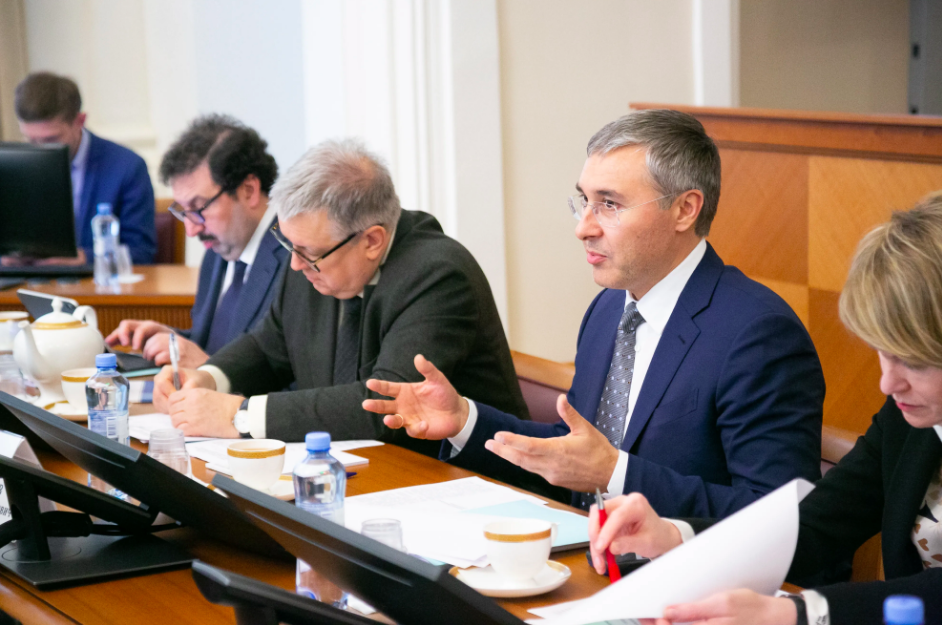‘It Is Difficult Times like These that Bring Us Closer Together’

On March 23, the working group of the Russian Ministry of Science and Higher Education devoted to university education met again to discuss how education should be organized as Russia seeks to prevent the spread of COVID-19. In particular, the group discussed tactics involving volunteerism on university campuses, examples from universities abroad, and developing student questionnaires in order to pinpoint the issues that Russian universities have encountered in their transition to distance learning.
In his opening remarks, Valery Falkov, the Minister of Science and Higher Education, noted that over 80% of Russian universities have transitioned to remote learning. He encouraged other universities to do the same and rely on the lessons learned by their colleagues.
HSE Volunteers
HSE Vice Rector Valeria Kasamara shared HSE’s experience with volunteerism. She reiterated that volunteering is a social mission of the university, and it should be restructured in light of the new reality. Not only students and employees of the HSE University, but also its graduates and HSE Lyceum pupils can work as volunteers.
The focus of our volunteers’ attention should be, first and foremost, on senior people, said Valeria Kasamara. This includes pensioners working for the university, veterans, and those studying various courses under the Moscow Longevity project, co-organized by HSE University. Volunteers can assist them in meeting both their everyday life (e.g., food delivery) and study-related needs. For instance, 268 pensioners are now doing their English language courses online.
‘People don’t feel neglected or abandoned, which reduces stress and anxiety’, said the HSE Vice Rector.
Digital volunteering is most in demand. With support from its Digital Division, the HSE eLearning Office is training volunteers to provide qualified help to students and teachers with their remote studies. HSE University also aids its partner schools. Volunteer tutors with some pedagogical experience teach homeschooled students (although this does not mean they help these students study for Russia’s Unified State Exam [EGE]).
In Valeria Kasamara’s opinion, all these measures contribute to consolidating society. ‘It is difficult times like these that bring us closer together, and we appreciate our relationships with each other like never before’, she says.
Student questionnaire
Olga Chernyshova, Director of the Government’s Youth Policy and Social Higher Education Projects of the Russian Ministry of Science and Higher Education, said that public university students should be given a questionnaire about their experience with the newly implemented distance learning formats. In particular, the questionnaire will help the Ministry determine what challenges universities are facing, whether students have all of the necessary technical tools, how students spend their leisure time, and so on. HSE University has developed the first draft of the questionnaire.
To Valery Falkov’s question of how to get the relevant information from students as quickly as possible without having to use administrative tools, Ivan Gruzdev, HSE Director for Internal Monitoring and Student Academic Development, replied that the first stage of the questionnaire will be conducted on VKontakte, Russia’s largest social media network. No one will force the students to complete the questionnaire—they may do so if they wish once they see the link.
‘We have already tried out some surveys like this before. They were carried out very quickly and rather informally without having to utilize any administrative leverage,’ he said.
Students will be able to answer the questionnaire over the course of the next few days (it is expected that tens of thousands of students will complete the survey). The results are planned to be submitted to the Ministry by April 6. It will then take us a month to prepare and carry out another ‘more calibrated’ survey, said Ivan Gruzdev. Students are expected to receive the questions via email or in their personal LMS accounts.
Valey Falkov recommended that the survey organizers get sociology students of Russia’s regional universities involved. He pointed out that the survey will become an effective learning tool for many of those students.
Analyzing the Situation
Isak Froumin, Tenured Professor of the HSE Institute of Education, presented examples from universities abroad in organizing educational processes during times of crisis. The Institute receives this information from colleagues and education researchers working in over twelve countries.
‘I was deeply shocked by a conversation with my colleague from the Polytechnic University of Milan,’ said Isak Froumin. ‘He blames himself and his colleagues harshly for not having taken the social distancing measures seriously enough.’
Many universities focused more on switching to online studies than ensuring social distancing. This resulted, for instance, in German students going to beer bars to watch online lectures. The universities should have started by doing their best to curb the spread of COVID-19 virus from the very beginning.
According to Isak Froumin, there is still no information about the pandemic on the front webpages of some Russian universities. Prof. Froumin suggested that the Ministry should ensure that all universities rectify this. Prof. Froumin gave the website of Ulianov Chuvash State University as a good example of a site containing all relevant information on the necessary precautions. He also mentioned the example of the Far Eastern Federal University that had held an online lecture of a qualified virologist to discuss the current situation.
‘It all starts with people,’ said Valery Falkov. ‘If a rector believes that all the protective measures are just a whim and something thought up from above, and that there was no and is no virus, their attitude will immediately change as soon as, God forbid, they have their first coronavirus case on their own campus.’
Recommendations
Following the meeting, Yaroslav Kuzminov, HSE Rector and Deputy Chairperson of the working group, suggested that remote project learning for engineers and designers and possible ways of conducting final exams should be considered in the near future.
Rector Kuzminov recommended considering examples of 20.35 University services being used by five universities so that other higher education institutions could evaluate the opportunities offered by the platform to arrange educational process under the new conditions.

